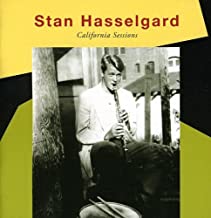
Daily Dose Of Jazz…
Sten Åke Henry “Stan” Hasselgård was born on October 4, 1922 in Sundsvall, Sweden. His father, John Levin Johansson changed his name to John Hasselgård. Growing up in Bollnäs, Sweden, he began playing clarinet at age 16, attended the University of Uppsala, and played in the Royal Swingers there.
In 1945 he played in a quintet led by Arthur Österwall, and founded a new Royal Swingers group that same year. In 1946-47 he played with Simon Brehm’s sextet alongside pianist Gösta Eriksson, trumpeter Bror Hansson, guitarist Kurt Wärngren, and drummer Bertil Frylmark.
Having achieved international renown, he moved to New York City in 1947, and played on 52nd Street with Jack Teagarden and Max Roach. Under the stage name Stan Hasselgard he made his acclaimed recording of Swedish Pastry. and in 1948 he joined Benny Goodman’s septet, alongside Wardell Gray, Mary Lou Williams and others.
His last recording session took place on November 18th, because five days later he was killed in a car crash. Clarinetist Stan Hasselgard passed away on November 23, 1948 in Decatur, Illinois. He was 26.
More Posts: bandleader,clarinet,history,instrumental,jazz,music
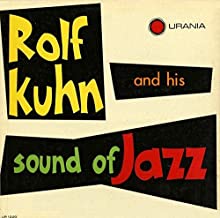
Daily Dose Of Jazz…
Rolf Kühn was born on September 29, 1929 in Köln, Germany, the older brother of the pianist Joachim Kühn. He started out playing in dance bands in the late ’40s, then worked with radio orchestras starting in 1952 before moving west across the Atlantic to America.
Living in the United States for three years from 1956 to 1959, subbing for Benny Goodman on a few occasions, played in the Tommy Dorsey ghost band, and worked in a big band led by Urbie Green. Rolf drew favorable reviews, and over the course of his career, he recorded more than two-dozen albums as a leader, ten with his younger brother, and as a sideman, eighteen.
He has recorded with Eddie Costa, Buddy DeFranco,Klaus Doldinger, Tommy Dorsey, European Jazz Ensemble, Urbie Green, Friedrich Gulda, Greetje Kauffeld, Eartha Kitt, Albert Mangelsdorff, Oscar Pettiford, and George Wallington.
In 2008 he founded a band with Christian Lillinger, Ronny Graupe, and Johannes Fink. In 2019, the New York Times Magazine listed him among the hundreds of artists whose material was reportedly destroyed in the 2008 Universal fire. Clarinetist and saxophonist Rolf Kühn at 90 continued to perform and compose for the next two years until his passing on August 18, 2022 in Berlin, Germany.
More Posts: bandleader,clarinet,composer,history,instrumental,jazz,music,saxophone
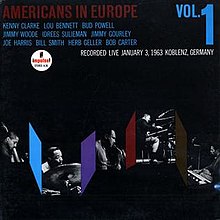
Daily Dose Of Jazz…
William Overton Smith was born on September 22, 1926 in Sacramento, California and grew up in Oakland, California where he began playing clarinet at the age of ten. Putting together a jazz group to play for dances at 13, by 15 he joined the Oakland Symphony. Idolizing Benny Goodman, after high school and a brief cross-country tour with a dance band, he ended his romance for the road. Giving notice when the band reached Washington, D.C., he was encouraged by an older band member to get the best education he could, so he headed to New York.
He started his formal music studies at the Juilliard School of Music, playing in New York jazz clubs at night. Uninspired at Juilliard, he returned to California after hearing the music of Darius Milhaud, who was then teaching at Mills College in Oakland. At Mills, Smith met pianist Dave Brubeck, with whom he often played, was a member of the Dave Brubeck Octet, and later occasionally subbed for saxophonist Paul Desmond in the Dave Brubeck Quartet. Brubeck’s 1960 album Brubeck à la mode that featured ten of his own compositions. Rejoining Brubeck’s group in the 1990s.
Bill went on to study composition with Roger Sessions at the University of California, Berkeley, where he was graduated with a bachelor’s and a master’s degree. He won the Prix de Paris, study at the Paris Conservatory, was awarded the prestigious Prix de Rome in 1957, and spent six years in Italy. After a teaching stint at the University of Southern California, he went on to a thirty-year career at the University of Washington School of Music in Seattle, Washington. He co-led the forward-thinking Contemporary Group, first with Robert Suderburg, and then with trombonist Stuart Dempster, from 1966 to 1997.
Clarinetist and composer Bill Smith, who recorded in jazz, classical and third stream genres, passed away at age 93 in his home from complications of prostate cancer on February 29, 2020.
More Posts: bandleader,clarinet,educator,history,instrumental,jazz,music
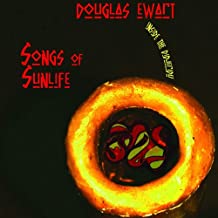
Daily Dose Of Jazz…
Douglas Ewart was born on September 13, 1946 in Kingston, Jamaica and emigrated to the United States in 1963. Settling in Chicago, Illinois he became associated with the Association for the Advancement of Creative Musicians (AACM) in 1967, studying with Joseph Jarman and Roscoe Mitchell. He served as that organization’s president from 1979 to 1986.
Douglas recorded eight albums as a leader and has performed or recorded fifteen with J. D. Parran, Muhal Richard Abrams, Art Ensemble of Chicago, Anthony Braxton, Alvin Curran, Anthony Davis, Robert Dick, Von Freeman, Joseph Jarman, Amina Claudine Myers, Roscoe Mitchell, James Newton, Rufus Reid, Wadada Leo Smith, Cecil Taylor, Richard Teitelbaum, Henry Threadgill, Hamid Drake, Don Byron, Malachi Favors Maghostut, Muhal Richard Abrams, Spencer Barefield, Tani Tabbal, Jean-Luc Cappozzo, Joëlle Léandre, Bernard Santacruz, Michael Zerang, Chico Freeman, Dennis González, Yusef Lateef, Adam Rudolph,
In 1992 he collaborated with Canadian artist Stan Douglas on the video installation Hors-champs which was featured at Documenta 9 in Kassel, Germany. The installation features Ewart in improvisation of Albert Ayler’s Spirits Rejoice with musicians George Lewis, Kent Carter, and Oliver Johnson.
Douglas Ewart has lived in Minneapolis, Minnesota since 1990 and plays sopranino and alto saxophones, clarinets, bassoon, flute, bamboo flutes, panpipes, and didgeridoo; as well as Rastafarian hand drums.
More Posts: bamboo flute,bassoon,clarinet,didgeridoo,flute,hand drums,history,instrumental,jazz,music,panpipe,saxophone
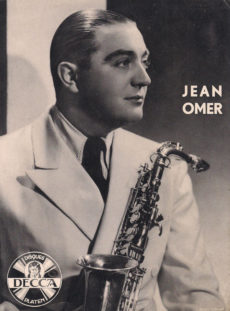
Daily Dose Of Jazz…
Jean Omer was born in Nivelles, Belgium on September 9, 1912. He played violin before switching to clarinet and saxophone, playing with local groups in Strassburg and Brussels. He worked in France in the band of Billy Smith, then played with the Golden Stars and in René Compère’s band.
Omer participated in a recording session with Gus Deloof in 1931. Following a tour with Fud Candrix’s Carolina Stomp Chasers, he founded his own group, which included at times, Lauderic Caton and Jean Robert. He and Robert De Kers accompanied Josephine Baker in the mid-1930s and played in a group with Ernst van’t Hoff late in the decade.
In 1941, he recorded with Rudy Bruder. He settled in Brussels and led a band into the 1960s which played at the club Le Boeuf sur le Toit. Clarinetist, saxophonist, and bandleader Jean Omer passed away on May 30, 1994 in Brussels, Belgium.
More Posts: bandleader,clarinet,history,instrumental,jazz,music,saxophone



